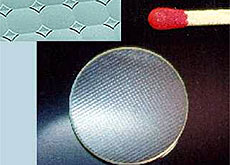Heptagon funding boosts Swiss micro-optics cluster

A Swiss Center for Electronics and Microtechnology (CSEM) spin-off company, Heptagon, has received €6.2 million in venture capital funding to develop its marketing and production capacity.
The firm’s founders invented a new manufacturing process to make micro-optical devices in volume and at high speed.
Existing investors, the Finnish National Fund for Research and Development (Sitra) and InnovationsKapital of Sweden, came back for this round.
Plus there are two new backers, Innovacom, which got its start as the corporate venture arm of France Telecom, and High Tech Private Equity, based in Germany and founded by a former executive of the firm Jenoptik.
“With this [capital] we will be able to leverage our unique technology and to become the leader in some key markets,” says Andreas Herren, CEO of Heptagon.
Heptagon has its headquarters in Espoo, Finland, and its CEO and production facilities are in Zurich.
Disruptive technology
The optics it makes are tiny, lightweight pieces of glass or polymer that can focus light, shape it, split it, or disperse it.
These optics have surface features that make a match head look big and are capable of replacing much larger, so-called bulk optics, as well as enabling brand new products and innovations.
Heptagon’s products can be found in micro-lenses and are used in light-emitting diodes to make them appear brighter.
The LED market is probably the fastest growing in the semiconductor industry today. They are also found in sophisticated new camera-on-chip systems, as well as lasers and a number of other applications.
“Our innovation solves problems that conventional optics have failed to. It is one of the key reasons for Heptagon’s growth,” Herren told Swiss Venture earlier this year during a company tour.
The venture capital funding sends a signal that the market for micro-optics is poised for growth. This is good news for Swiss companies and researchers in the field who have been working on alternatives to conventional bulk optics for a number of years.
Swiss companies, such as Leica Geosystems, Swissoptic and SpectroSolutions make products that exploit micro-optics.
Micro-optics
Swiss-based researcher Hans Peter Herzig of the Institute for Microtechnology (IMT) at the University of Neuchâtel literally wrote the book on micro-optics. It is called “Micro-Optics: Elements, Systems and Applications” and is published by Taylor and Francis.
The German firm, Suess, established a subsidiary in Neuchâtel to be near the IMT, as well as the CSEM. Suess MicroTec makes even smaller optical devices using techniques adapted from the semiconductor industry.
Heptagon raised seed capital in 1999. Earlier this year, Herren told Swiss Venture that his firm intended to raise €6 million by the end of 2003.
He achieved that goal, which is no small feat in today’s tough venture investing environment, due to the firm’s advanced stage.
It has revenues of greater than SFr8 million (estimated) and a number of big-name customers. Although the Swiss/Finnish firm is secretive about its customers, it does name two: Leica Geosystems and Sony’s consumer electronics division.
The reason for secrecy, according to Herren, is that Heptagon’s customers are working with a revolutionary technology that gives them a significant competitive advantage. It is a disruptive technology, so they don’t want competitors to know that they are working with one of the few companies in the world that can deliver this kind of micro-optical component.
by Valerie Thompson

In compliance with the JTI standards
More: SWI swissinfo.ch certified by the Journalism Trust Initiative








You can find an overview of ongoing debates with our journalists here . Please join us!
If you want to start a conversation about a topic raised in this article or want to report factual errors, email us at english@swissinfo.ch.